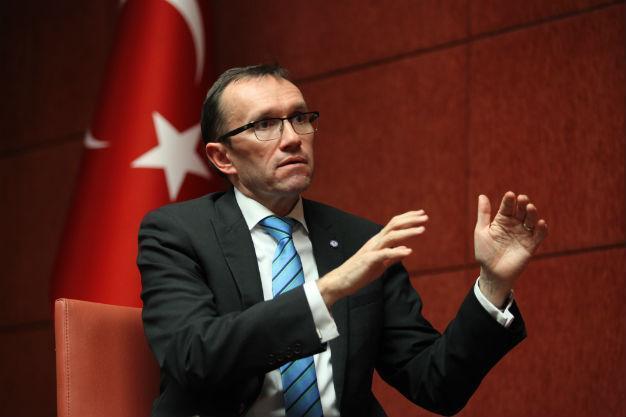No return to 1960s for Turkish Cypriots: UN envoy
Emine Kart - ANKARA

HÜRRİYET photo
The U.N.’s top official on the Cyprus issue has vowed that a final deal to reunite the divided east Mediterranean island will avoid any repeat of the sufferings of Turkish Cypriots in the 1960s, saying a “solid conclusion on governance” will guarantee the security of both Turkish and Greek Cypriots.
The U.N. Secretary-General’s Special Adviser on Cyprus, Espen Barth Eide, was in Ankara for talks with Prime Minister Ahmet Davutoğlu, Foreign Minister Mevlüt Çavuşoğlu and Foreign Ministry Undersecretary Feridun Sinirlioğlu.
In a Twitter message posted after his meeting with Davutoğlu late on Dec. 8, Eide said he had “a substantive meeting with Davutoğlu on Cyprus and region, security and guarantees.”
Taking pains not to directly comment on the wish of Ankara and the Turkish Cypriots to maintain Turkey’s guarantor status in any final U.N. led-deal, Eide said “a solid conclusion on governance” would guarantee the security of both the Turkish Cypriots and the Greek Cypriots.
“Security should not be reduced just to a question of troops and military issues. Security is first and foremost living together in peace in a successful federal construction. Sometimes I feel that the security questions are too narrow. Guarantees or troops are a part of it, but we have to see the complexity of the situation,” Eide told the Hürriyet Daily News on Dec. 9, after wrapping up his talks with the Turkish officials.
“Maybe a solid conclusion on governance that provides for the safety of the Turkish Cypriots, so that that there is no way that the events of the 1960s can happen again, may also be the key to any kind of adaptation of a security regime,” he added.
The half-century-old Cyprus problem erupted after the island was granted independence from Britain in 1960, soon followed by an outbreak of inter-communal clashes in 1963. The island was ethnically divided between a Greek south and a Turkish north when the Turkish military intervened in 1974 under the terms of the 1960 Treaty of Guarantee after diplomacy failed to end unrest on the island. In addition to the Turkish Cypriot Peace Forces Command (KTBK), made up of 4,500 Turkish Cypriots, there are around 35,000 Turkish troops stationed on the island.
“We have to involve the guarantor states in the negotiations: Turkey, the U.K., and Greece. The official positions are well known, Turkey wants guarantees to go on and Greece wants them to go. We are looking for ways to make sure that everybody in Cyprus feels secure, but in such a way that their security is not undermining the security of somebody else,” Eide said.
“This is what we call ‘cooperative security,’ in the sense that Turkish Cypriots need to be safe as the smaller community and they need to be safe not only in the physical or military sense but also in the political construct. There must be good space for them to preserve their political and cultural identity in the constituent state. At the same time, we want the Greek Cypriots to feel themselves confident and safe in the construct too,” he added.
In a statement released earlier this week, Turkish Cypriot leader Mustafa Akıncı stressed the importance of Turkey’s guarantor status in making the Turkish Cypriots feel secure.
“Turkish Cypriots see their security in the continuation of Turkey’s guarantor status,” Akıncı said.
Eide described these as “sensitive issues” that will be “discussed later on.”
“What I’m now doing is spending time with the leaders of the guarantor powers and the leaders in Cyprus, to see what kind of mutual accommodation can be found. The key goal that we all now agree on is that both communities need to feel security not only today but in the long run, in such a way that enhances the other’s security. If one has security to the detriment of another, then it is not producing security overall,” he added.
